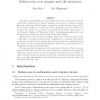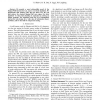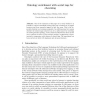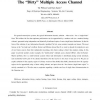263 search results - page 24 / 53 » Extracting Randomness Using Few Independent Sources |
142
Voted
AIME
2009
Springer
15 years 6 months ago
2009
Springer
We use the concept of conditional mutual information (MI) to approach problems involving the selection of variables in the area of medical diagnosis. Computing MI requires estimate...
FOCS
2008
IEEE
15 years 8 months ago
2008
IEEE
A merger is a probabilistic procedure which extracts the randomness out of any (arbitrarily correlated) set of random variables, as long as one of them is uniform. Our main result...
98
Voted
CORR
2008
Springer
15 years 2 months ago
2008
Springer
We provide a novel achievability proof of the Slepian-Wolf theorem for i.i.d. sources over finite alphabets. We demonstrate that random codes that are linear over the real field ac...
ECTEL
2009
Springer
15 years 7 hour ago
2009
Springer
One of the objectives of this paper is to verify whether it is possible to extract meaningful related tags from a limited set of tagged resources and from resources tagged by only ...
CORR
2008
Springer
15 years 2 months ago
2008
Springer
For general memoryless systems, the typical information theoretic solution - when exists - has a "single-letter" form. This reflects the fact that optimum performance ca...




